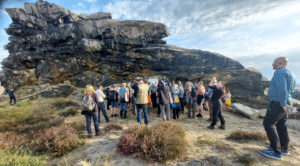INQUA 1301my: PALEO constraints on SEA-level rise (PALSEA)
The overarching goal of PALSEA is to improve our understanding of past sea level change to inform predictions of future sea level and cryosphere evolution.
Abstract

PALEO constraints on SEA-level rise (PALSEA) working group addresses the greatest uncertainty in projecting future sea-level rise, which lies in predicting melt contributions from Earth’s remaining ice sheets.
The observational period of climate variability spans, at best, only the last century, which hinders gaining a full understanding of ice sheet and sea level changes under different temperature and CO2 forcing. To broaden this observational window, we can study geologic records that span thousands of years and provide valuable archives of how ice sheets and sea level have responded to past climate variability, particularly during periods of extended warmth.
Therefore, the information in the geological records helps assess the relationship between ice sheets, sea level and climate change, providing a firm basis for projecting future changes.
Objectives:
- Develop and refine relative sea level (RSL) reconstructions with improved age and elevation uncertainties, from which rates of sea-level change may be estimated;
- Increase the spatial and temporal distribution of gold-standard datasets of RSL and ice-sheet change, to better constrain patterns of change;
- Develop a better understanding of the physical processes involved in ice sheet collapse and its solid Earth response;
- Provide constraints on the timing and drivers of ice-sheet contribution to periods of Quaternary (and Pliocene) sea-level rise to validate future developments in coupled climate-ice sheet models and make future predictions;
- Foster open discussions and an inclusive atmosphere for ECRs.
Project leaders:
- Jacqueline Austermann Columbia, University, NY, USA
- Natasha Barlow, University of Leeds, UK
- Alessio Rovere, University of Venice, Italy
- Jeremy Shakun Boston College, MA, USA





